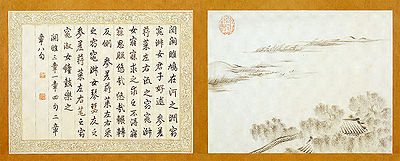The Classic of Poetry, also Shijing or Shih-ching, translated variously as the Book of Songs, Book of Odes, or simply known as the Odes or Poetry (Chinese: 詩; pinyin: Shī) is the oldest existing collection of Chinese poetry, comprising 305 works dating from the 11th to 7th centuries BC. It is one of the "Five Classics" traditionally said to have been compiled by Confucius, and has been studied and memorized by scholars in China and neighboring countries over two millennia. Since the Qing dynasty, its rhyme patterns have also been analysed in the study of Old Chinese phonology.
The Book of Documents (Shujing, earlier Shu-king) or Classic of History, also known as the Shangshu, is one of the Five Classics of ancient Chinese literature. It is a collection of rhetorical prose attributed to figures of ancient China, and served as the foundation of Chinese political philosophy for over 2,000 years.
The Book of Documents was the subject of one of China's oldest literary controversies, between proponents of different versions of the text. The "New Text" version was preserved from Qin Shi Huang's burning of books and burying of scholars by scholar Fu Sheng. The longer "Old Text" version was supposedly discovered in the wall of Confucius' family estate in Qufu by his descendant Kong Anguo in the late 2nd century BC, lost at the end of the Han dynasty and rediscovered in the 4th century AD. Over time, the "Old Text" version of the Documents became more widely accepted, until it was established as the imperially sanctioned edition during the early Tang dynasty. This continued until the late 17th century, when the Qing dynasty scholar Yan Ruoqu demonstrated that the additional "Old Text" chapters not contained in the "New Text" version were actually fabrications "reconstructed" in the 3rd or 4th centuries AD.
The chapters are grouped into four sections representing different eras: the semi-mythical reign of Yu the Great, and the Xia, Shang and Zhou dynasties. The Zhou section accounts for over half the text. Some of its New Text chapters are among the earliest examples of Chinese prose, recording speeches from the early years of the Zhou dynasty in the late 11th century BC. Although the other three sections purport to record earlier material, most scholars believe that even the New Text chapters in these sections were composed later than those in the Zhou section, with chapters relating to the earliest periods being as recent as the 4th or 3rd centuries BC.
The I Ching ([î tɕíŋ]), or Classic of Changes, is an ancient divination text and the oldest of the Chinese classics. Possessing a history of more than two and a half millennia of commentary and interpretation, the I Ching is an influential text read throughout the world, providing inspiration to the worlds of religion, psychoanalysis, business, literature, and art. Originally a divination manual in the Western Zhou period (1000–750 BC), over the course of the Warring States period and early imperial period (500–200 BC) it was transformed into a cosmological text with a series of philosophical commentaries known as the "Ten Wings."[2] After becoming part of the Five Classics in the 2nd century BC, the I Ching was the subject of scholarly commentary and the basis for divination practice for centuries across the Far East, and eventually took on an influential role in Western understanding of Eastern thought.
The I Ching uses a type of divination called cleromancy, which produces apparently random numbers. Four numbers, 6 to 9, are turned into a hexagram, which can then be looked up in the I Ching book, arranged in an order known as the King Wen sequence. The interpretation of the readings found in the I Ching is a matter of centuries of debate, and many commentators have used the book symbolically, often to provide guidance for moral decision making as informed by Taoism and Confucianism. The hexagrams themselves have often acquired cosmological significance and paralleled with many other traditional names for the processes of change such as yin and yang and Wu Xing.

No comments:
Post a Comment